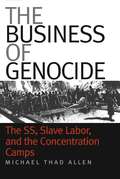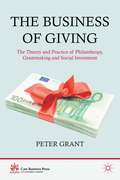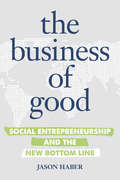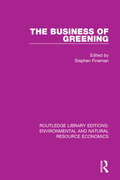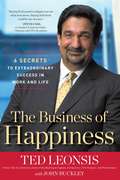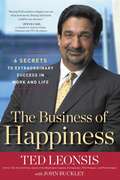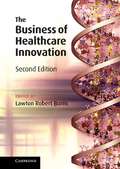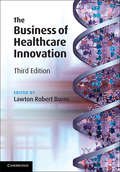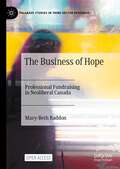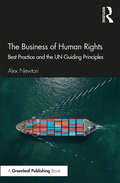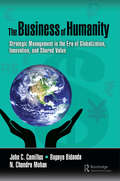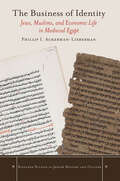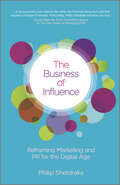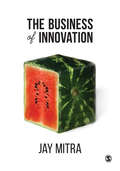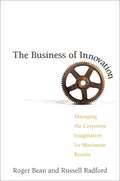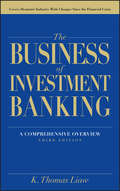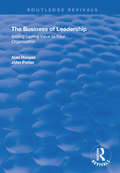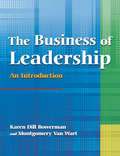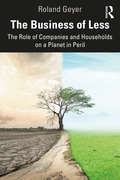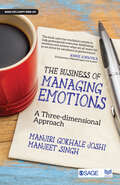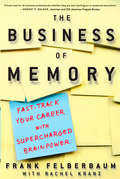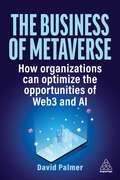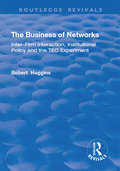- Table View
- List View
The Business of Genocide
by Michael Thad AllenDuring World War II, hundreds of thousands of prisoners were worked to death by the Nazis under a brutal system of slave labor in the concentration camps. By 1942, this vast network of slavery extended across all of German-occupied Europe, but the whole operation was run by a surprisingly small staff of bureaucrats--no more than 200 engineers and managers who worked in the Business Administration Main Office of the SS. Their projects included designing and constructing the concentration camps and gas chambers, building secret underground weapons factories, and brokering slave laborers to private companies such as Volkswagen and IG Farben. The Business of Genocide powerfully contradicts the assumption that the SS forced slavery upon the German economy, demonstrating that instead industrialists actively sought out the Business Administration Main Office as a valued partner in the war economy. Moreover, while the bureaucrats who oversaw Holocaust operations have often been seen as technocrats or simple "cogs in the machinery," the book reveals their ideological dedication, even fanatical devotion, to slavery and genocide in the name of National Socialism.During World War II, hundreds of thousands of prisoners were worked to death by the Nazis under a brutal system of slave labor in the concentration camps across all of German-occupied Europe. The whole operation was run by a surprisingly small staff of bureaucrats--no more than 200 engineers and managers who worked in the Business Administration Main Office of the SS. Michael Thad Allen powerfully contradicts the assumption that the SS forced slavery upon the German economy, demonstrating that instead industrialists actively sought out the Business Administration Main Office as a valued partner in the war economy. Moreover, while the bureaucrats who oversaw Holocaust operations have often been seen as technocrats or simple "cogs in the machinery," this book reveals their ideological dedication, even fanatical devotion, to slavery and genocide in the name of National Socialism.-->
The Business of Giving
by Peter GrantThe Business of Giving reviews current thinking and surveys the key techniques any philanthropist or grantmaker should adopt. It also outlines a generic social investment process that can be utilized for all philanthropic or grantmaking programmes. Essential reading for all engaged in or with an interest in philanthropy or civil society in general.
The Business of Good: Social Entrepreneurship and the New Bottom Line
by Jason HaberThe Business of Good narrates the story behind social entrepreneurship as told by the individuals compelled to create a change in the world--not just another business. Serial and social entrepreneur Jason Haber intertwines case studies, anecdotes, and initiatives that have become part of the larger narrative of entrepreneurship.From Main Street to Wall Street, today's social entrepreneurs are rebooting capitalism, challenging the charitable industrial complex, and are disrupting the way companies do business with exciting innovations designed to solve society's most vexing problems. In this book, Haber examines Capitalism 2.0, philanthropy, and the role and power of media alongside the world's response as social entrepreneurship changes how we give, how we invest, and who we are.
The Business of Greening (Routledge Library Editions: Environmental and Natural Resource Economics)
by Stephen FinemanThe Business of Greening, first published in 2000, debates the relationship between business and greening, and the future form this relationship could take. The book gives voice to industrial actors - employees, employers, managers, technical specialists, regulators - in the context of their organizations, within industrial sectors or as part of wider institution regimes. The business of greening is taken as socially constructed, shaped through tensions and competing interests. It produces outcomes that are sometimes unexpected, sometimes hopeful. These outcomes are explored by examining a range of workers, including estate agents, bankers, bakers, printers, regulators, in small and large corporations. Contributors write from a wide range of different social sciences including sociology, geography, organizational science and psychology. This title will be of particular interest to students and researchers of environmental and business studies, and to those who shape environmental policy in government and industry.
The Business of Happiness: 6 Secrets to Extraordinary Success in Life and Work
by Ted Leonsis John BuckleyWhat's Your Plan For Happiness?When the plane he was on prepared for a crash landing, Ted Leonsis asked himself the crucial question, If today is my last day on earth-will I die happy?. . . and realized the answer was no. Despite having achieved massive business success-he was a self-made multi-millionaire at the age of twenty-seven-he realized he would die unfulfilled. He told God that if he survived, he would turn his life around, give back more than he took, and pursue happiness. After walking off that plane, he got to work.In The Business of Happiness, Ted Leonsis, owner of the Washington Capitals and former group president and vice chairman of AOL, shares the six secrets of happiness he discovered since that fateful plane ride. Treating happiness as a goal like any other, he made a list of what he thought would make him happy, and made a plan to achieve his goals. Along the way he discovered an incredible truth-business or financial success doesn't bring happiness, but happiness can bring you business and financial success.Inside The Business of Happiness, you'll learn, as Ted did:* How success follows happiness (not the other way around)* The importance of having a "double bottom line"-and how you really can do well by doing good* The key to finding your own higher calling* Why you should have a life plan for happiness, just as an entrepreneur has a business plan to launch and sustain a business* The six essential secrets that lead to happiness and success* How Ted lived his journey from a Brooklyn kid to sports team franchise owner-and the lessons learned along* What was on Ted's list-and what should be on yoursNothing is more universal than the desire to be happy. Ted Leonsis has made a lifetime's study of that desire and how to achieve it-and now he wants to share what he's learned with you. The Business of Happiness will show you how to become the happy, successful, and generous person you've always wanted to be.
The Business of Happiness: 6 Secrets to Extraordinary Success in Work and Life
by Ted Leonsis John BuckleyLeonsis, a business, sports, and media mogul, proves and explains that success may or may not make one happy, but happiness will almost always make one more successful.
The Business of Healthcare Innovation
by Lawton Robert BurnsThe Business of Healthcare Innovation is a wide-ranging analysis of business trends in the manufacturing segment of the healthcare industry. It provides a thorough overview and introduction to the innovative sectors fueling improvements in healthcare: pharmaceuticals, biotechnology, platform technology, medical devices and information technology. For each sector, the book examines the basis and trends in scientific innovation, the business and revenue models pursued to commercialize that innovation, the regulatory constraints within which each sector must operate and the growing issues posed by more activist payers and consumers. Specific topics include market structure and competition, the economics and rationale of product development, pricing, sales and marketing, contract negotiations with buyers, alliances versus mergers, business strategies and prospects for growth. Written by professors of the Wharton School and industry executives, the book shows why healthcare sectors are such an important source of growth in any nation's economy.
The Business of Healthcare Innovation
by Lawton Robert BurnsThe tech sectors are the least understood portion of the healthcare system, but the ones that supply most of the innovation in healthcare services and generate most revenue. Fully updated for this third edition, The Business of Healthcare Innovation is a wide-ranging analysis of business models and trends in the tech sectors of the healthcare industry. It provides a thorough overview of and introduction to the innovative sectors that fuel improvements in healthcare: pharmaceuticals, biotechnology, life science startups, medical devices and information technology. For each sector, the book examines the trends in scientific innovation, the science behind that innovation, the business and revenue models pursued to commercialize that innovation, the regulatory constraints within which each sector must operate and the growing issues posed by activist payers and consumers. From a combination of academic and industry perspectives, the authors show why healthcare sectors are such an important source of growth in any nation's economy.
The Business of Hope: Professional Fundraising in Neoliberal Canada (Palgrave Studies in Third Sector Research)
by Mary-Beth RaddonThis open access book contributes to research on the ascendance of neoliberalism in Canada through the vantage point of professional fundraising in the 1990s and 2000s. Fifty high-ranking fundraisers from across Canada were interviewed through 2008 and 2009 about changes they had witnessed since starting their careers. Fundraising as an occupation was burgeoning in this period in response to the devolution of state responsibility across the major domains of nonprofit activity: education, health care, social services, the arts, recreation, overseas humanitarian activities, and environmental protection. Welfare state retrenchment left the nonprofit and voluntary sector competing for private sources of funding with the help of these newly hired expert staff. As fundraisers worked to instill a culture of philanthropy, while targeting the ultra-rich and advocating for tax-favourable treatment of major gifts, they became both products and promoters of the neoliberal political and cultural reconstruction of Canadian society.This is an open access book.
The Business of Human Rights: Best Practice and the UN Guiding Principles
by Alex NewtonThe spotlight of global scrutiny has shone particularly brightly on corporations’ adverse impacts on human rights in recent years. Corporations make up more than two-thirds of the world’s top economies today, and so rightly they are being called to account for their impacts on society and the communities in which they operate. The Business of Human Rights demystifies the relevance of human rights for business, explaining how the corporate responsibility to respect human rights under the UN Guiding Principles can be implemented in practice. It provides a straightforward, practical guide that can be easily read and interpreted by managers to help businesses navigate this complex area of legislation and "soft" law to fulfil their responsibilities. It explains the potential legal, financial and reputational implications for corporations and the steps they need to take to address them. The book tracks some of the major global developments in business and human rights, including the emergence of foreign, transnational, and international law and the proliferation of multi-stakeholder initiatives on business and human rights. Case studies from a range of sectors and industries – such as extractives, apparel, fast-moving consumer goods, electronics, and banking and finance – illustrate the enormous risks and opportunities human rights pose for business in practice. The Business of Human Rights will equip corporate executives, sustainability practitioners, academics, students, and anyone interested in business’s impacts on society with the essential information and tools they need to quickly come up to speed with the rapidly evolving area of business and human rights.
The Business of Humanity: Strategic Management in the Era of Globalization, Innovation, and Shared Value
by John Camillus Bopaya Bidanda N. Chandra MohanCompanies across the world, for a variety of reasons, are committing to incorporating social responsibility into their business models and finding that their profits are growing and their long-term sustainability is enhanced—building "humanity" into their business models as the driver of economic, environmental, and social sustainability. This fascinating development is a widely observable global phenomenon. The "Business of Humanity®" (BoH) Proposition is the synthesis of counter-intuitive but simple and powerful ideas about how companies can add value in today’s globalized and fast-changing world. The task of BoH Strategies is to overcome three critical challenges characterizing today’s business environment, namely disruptive technologies, conflicted stakeholders, and unknowable futures. BoH Strategies are designed to convert these challenges into opportunities for enhanced sustainability on all three dimensions—economic, environmental and social. Written by leading experts with decades of experience, this book: Provides a hands-on understanding of how to implement this powerful and rewarding approach to simultaneously add economic value and enhance social benefit Includes the experiences and approaches of highly regarded business executives and successful organizations Responds to the critical challenges created by three environmental mega forces – the inevitability of globalization, the imperative of innovation, and the importance of shared value. This book is based on lessons drawn from the real world and provides a compelling rationale for the power of the BoH Proposition. The pragmatic framework and process offered enable companies to develop and confidently implement value-adding strategies based on the BoH Proposition.
The Business of Identity: Jews, Muslims, and Economic Life in Medieval Egypt
by Phillip I. Ackerman-LiebermanThe Cairo Geniza is the largest and richest store of documentary evidence for the medieval Islamic world. This book seeks to revolutionize the way scholars use that treasure trove. Phillip I. Ackerman-Lieberman draws on legal documents from the Geniza to reconceive of life in the medieval Islamic marketplace. In place of the shared practices broadly understood by scholars to have transcended confessional boundaries, he reveals how Jewish merchants in Egypt employed distinctive trading practices. Highly influenced by Jewish law, these commercial practices served to manifest their Jewish identity in the medieval Islamic context. In light of this distinctiveness, Ackerman-Lieberman proposes an alternative model for using the Geniza documents as a tool for understanding daily life in the medieval Islamic world as a whole.
The Business of Influence
by Philip SheldrakeMedia has most definitely evolved, as have the ways in which we contemplate, design, communicate and execute strategy. And rather than technological evolution, we're plainly in the midst of a technological revolution.We have no choice then but to reframe marketing and PR in the context of 21st Century technology, 21st Century media and disintermediation, and 21st Century articulation of and appreciation for business strategy."Today, every organization is in the influence business. We influence customers to buy from us, employees to work for us, and the media to write about us. Gone are the days when you could be your own island. Now, to be successful, you need to live within the influence ecosystem and that requires a change of mindset. Fortunately, Philip Sheldrake will show you how."David Meerman Scott, bestselling author of The New Rules of Marketing & PR and the new hit Real-Time Marketing & PR
The Business of Innovation
by Jay MitraMoving beyond the narrow confines of a “how to” of Innovation management, The Business of Innovation sets out to track, trace and provide testimonies of innovation practice in small to large-scale organisations from countries around world. Through a combination of contemporary economic and social theory, and an array of practical examples from a wide range of sectors and industries, Jay Mitra offers critical insight into how global innovation works, where it works and most importantly, who makes it work, with an emphasis on innovative women. Suitable for postgraduate, doctoral and MBA students on business management and innovation courses and practitioners looking for a critical insight into the business of innovation.
The Business of Innovation
by Jay MitraMoving beyond the narrow confines of a “how to” of Innovation management, The Business of Innovation sets out to track, trace and provide testimonies of innovation practice in small to large-scale organisations from countries around world. Through a combination of contemporary economic and social theory, and an array of practical examples from a wide range of sectors and industries, Jay Mitra offers critical insight into how global innovation works, where it works and most importantly, who makes it work, with an emphasis on innovative women. Suitable for postgraduate, doctoral and MBA students on business management and innovation courses and practitioners looking for a critical insight into the business of innovation.
The Business of Innovation: Managing the Corporate Imagination for Maximum Results
by Roger Bean Russell RadfordThis is a guide to building innovative, creativity-rich organizations through astute and skillful management. Whatever the end goal, this book provides a systematic process for managing focused, usable innovation - without the micro-managing that can stifle creativity. With examples from McDonald's, Toyota, Palm (Pilot), 3M, Sony, Singapore Airlines and others, this model helps managers and executives: nurture an environment of innovation; support market-focused innovation through effective policies; gather expert feedback to properly evaluate innovations; develop and launch innovations successfully; and project future trends and developments.
The Business of Investment Banking
by K. Thomas LiawA comprehensive overview of investment banking for professionals and studentsThe investment banking industry has changed dramatically since the 2008 financial crisis. Three of the top five investment banks in the United States have disappeared, while Goldman Sachs and Morgan Stanley have converted to commercial banking charters. This Third Edition of The Business of Investment Banking explains the changes and discusses new opportunities for students and professionals seeking to advance their careers in this intensely competitive field.The recent financial regulation overhaul, including the Dodd-Frank legislation, is changing what investment banks do and how they do it, while the Volcker rule has shaken up trading desks everywhere.This new edition updates investment banking industry shifts in practices, trends, regulations, and statisticsIncludes new chapters on investment banking in BRIC countries, as Brazil, Russia, India, and China now account for a quarter of the global economyExplains the shift in the listing of securities away from New York to various financial centers around the world, and how major exchanges compete for the same businessThis new edition, reflecting the current state of the investment banking industry, arrives in time to better serve professionals wanting to advance their careers and students just beginning theirs.
The Business of Leadership: Adding Lasting Value to Your Organization (Routledge Revivals)
by John Potter Alan HooperFirst published in 1997, this volume special feature is its combination of practical and psychological behavioural aspects of leadership, presented in an easy readable style, which is designed for practising managers and for business schools. It proposes a new concept of ‘the learning leader’ and considers: How effective leadership adds real value to organizations The Skills of foresight and vision The impact of leadership on individuals and teams Leadership competencies A blueprint for the Future – Continuous Leadership Development The authors combine academic knowledge with practical experience. Alan Hooper was a senior military officer with the Royal Marines and is now Director of the Centre for Leadership Studies at Exeter University, which runs the only MA/Postgraduate Diploma in Europe. John Potter is a behavioural scientist operating as an independent management consultant.
The Business of Leadership: An Introduction
by Montgomery Van Wart Karen Dill BowermanSpecifically tailored to business students, this undergraduate textbook features a "how-to" approach and is filled with with current, lively examples and well-crafted learning tools. It takes readers from the kind of leradership they can exhibit in supervisory roles to the visionary leadership they must exhibit in management and executive roles.
The Business of Less: The Role of Companies and Households on a Planet in Peril
by Roland GeyerThe Business of Less rewrites the book on business and the environment. For the last thirty years, corporate sustainability was synonymous with the pursuit of ‘eco-efficiency’ and ‘win-win’ opportunities. The notion of ‘eco-efficiency’ gives us the illusion that we can achieve environmental sustainability without having to question the pursuit of never-ending economic growth. The ‘win-win’ paradigm is meant to assure us that companies can be protectors of the environment whilst also being profit maximizers. It is abundantly clear that the state of the natural environment has further degraded instead of improved. This book introduces a new paradigm designed to finally reconcile business and the environment. It is called ‘net green’, which means that in these times of ecological overshoot businesses need to reduce total environmental impact and not just improve the eco-efficiency of their products. The book also introduces and explains the four pollution prevention principles ‘again’, ‘different’, ‘less’, and ‘labor, not materials’. Together, ‘net green’ and the four pollution prevention principles provide a road map, for businesses and for every household, to a world in which human prosperity and a healthy environment are no longer at odds. The Business of Less is full of anecdotes and examples. This brings its material to life and makes the book not only very accessible, but also hugely applicable for everyone who is worried about the fate of our planet and is looking for answers.
The Business of Managing Emotions: A Three-Dimensional Approach
by Manjeet Singh Manjiri Gokhale JoshiWe work to create value in terms of sustenance or satisfaction. During this journey of creating value, we feel. Regardless of whether we are allowed to demonstrate it in public or whether we admit it to ourselves or not, whatever occurs at the workplace generates emotional moods. The expression of these emotions at work greatly depends on the social and cultural norms of various countries, regions, industries and the personal preference of people themselves. But the truth is, these emotions exist! The Navrasas comprise four negative emotional moods (rasas) that could hold back work performance, four positive ones that could spur productivity and a ninth one, which is the aim of this journey—the ability to sift the personal from the professional. The Business of Managing Emotions: A Three-Dimensional Approach offers practical solutions to leverage emotions at work through a three-dimensional emotional management (3-DEM) framework—an amalgamation of the performing arts, the medical science and the evolving social science of management.
The Business of Massage Therapy
by Mba Jessica Abegg Lmt MsibThis is the premiere guide to managing a successful massage career and running a successful holistic business. Written by veteran massage therapist and holistic business coach Jessica Abegg (LMT, MBA, MSIB), this visual, hands-on book contains all the tools readers need. It focuses on both practical concerns (such as finance and legal organization), and intangible elements of success (reflection, balance, and self-care). It also includes vital information on marketing and the Internet: knowledge often absent in the high-touch, low-tech world of massage. Throughout, it reflects the growing recognition that it is urgently important to help practitioners manage businesses and careers more successfully, as reflected in the inclusion of Business Practices in the new Massage Therapy Body of Knowledge.
The Business of Memory: How to Maximize Your Brain Power and Fast Track Your Career
by Frank FelberbaumThe first memory program specifically geared to business success--from the expert whose corporate seminars have boosted the careers of tens of thousands of employees and executives.At no point in history has the ability to synthesize and manage vast amounts of information been so crucial to business success. Yet research shows that within 3 hours to 3 days of learning something new, we'll forget 85 percent of what we've learned. Now, offering the same memory system he has used in his sought-after seminars and workshops, memory expert Frank Felberbaum shows you how to turn all that around. Instead of forgetting 85 percent of the people, facts, and ideas you are exposed to, you'll remember 85 percent--and you'll keep on remembering them as long as they are useful to you.Through a fun, easy-to-follow, four-step program that utilizes memory games, skills tests, and enjoyable interactive exercises, The Business of Memory will:o Improve your ability to retain, process, and retrieve information quickly and accuratelyo Teach you to harness your powers of observation, concentration, visualization, and associationo Inspire you with new excitement and confidence about your own mental abilitiesWith this simple program that requires only 10 minutes a day, you can vastly expand the amazing untapped powers of your mind--and set your career on the fast track.
The Business of Metaverse: How Organizations Can Optimize the Opportunities of Web3 and AI
by David PalmerThe metaverse is so much more than just a technology and immersive experience. Join digital visionary and global platform innovation expert David Palmer on this exciting journey exploring the metaverse and its myriad commercial, impact and career opportunities for business.The Business of Metaverse outlines the building blocks for success in the metaverse and how organizations can effectively position themselves to transition and benefit from it. It presents a unique framework showing how different components of the metaverse and the physical worlds can come together, providing a basis for strategic positioning for different sectors and industries and equipping readers with valuable insights into how they can anticipate and navigate key opportunities and challenges. Delving into this new world with embedded immersive capabilities, it explores what metaverse business entities could look like, the new business models in waiting and how businesses can gain competitive advantage through the power of interoperability. Taking a panoramic approach to opportunity, it examines the wide-ranging transformative impacts that the metaverse can bring to the business landscape, from equality and inclusive impact, new work and career paths and digital identities to new digital and data currencies in the metaverse economy.
The Business of Networks: Inter-Firm Interaction, Institutional Policy and the TEC Experiment
by Robert HugginsThis title was first published in 2000: The first book which brings together and interprets both the theoretical concepts associated with the study of networks in the business world, and the policy applications being applied to the practical building and development of such networks. It maps the changes in the culture of economic development policy that occurred in the UK during the 1990s, incorporating a detailed assessment of the contribution that the Training and Enterprise Councils made to business support policies. The book is published at a time when network and cluster building has risen to the top of economic development agendas not only in UK, but in many countries throughout the world. It offers the most detailed insight so far available into the structure, motivations and processes involved in developing business networks through institutional intervention. The book is relevant to anyone with an interest in business policy and theory.
